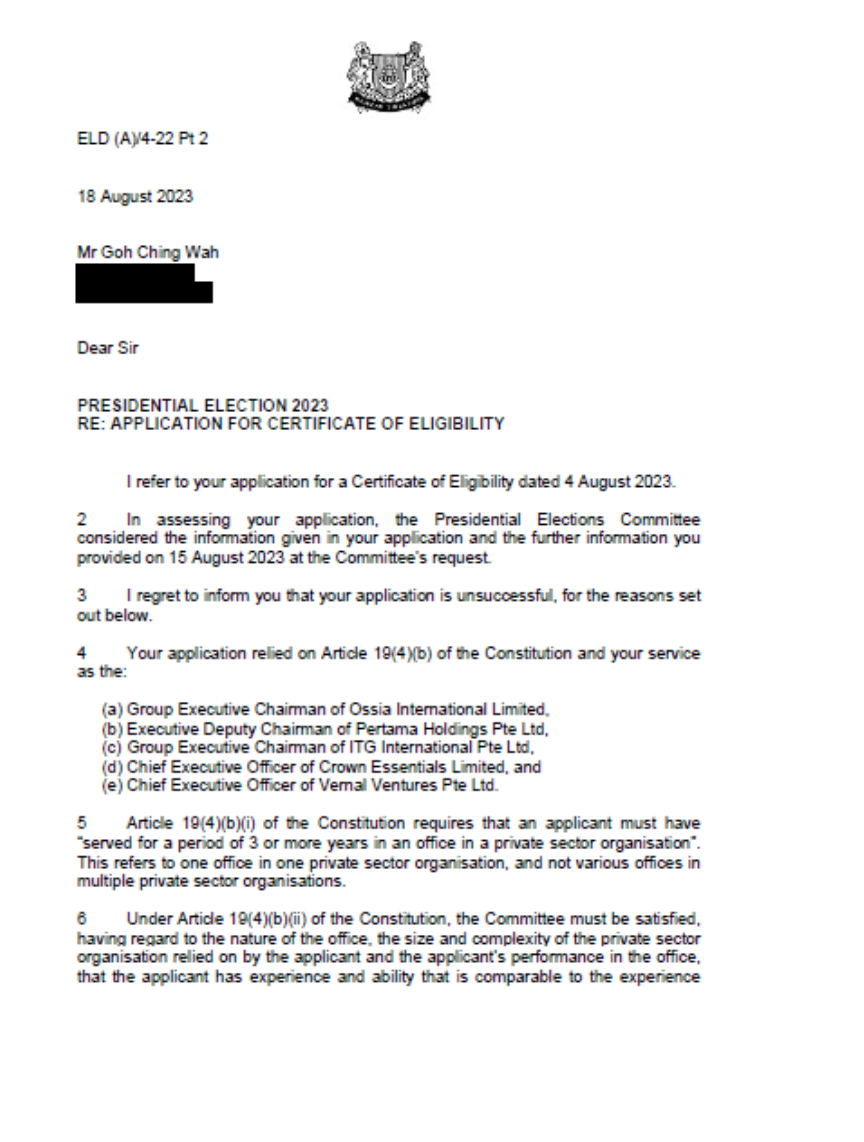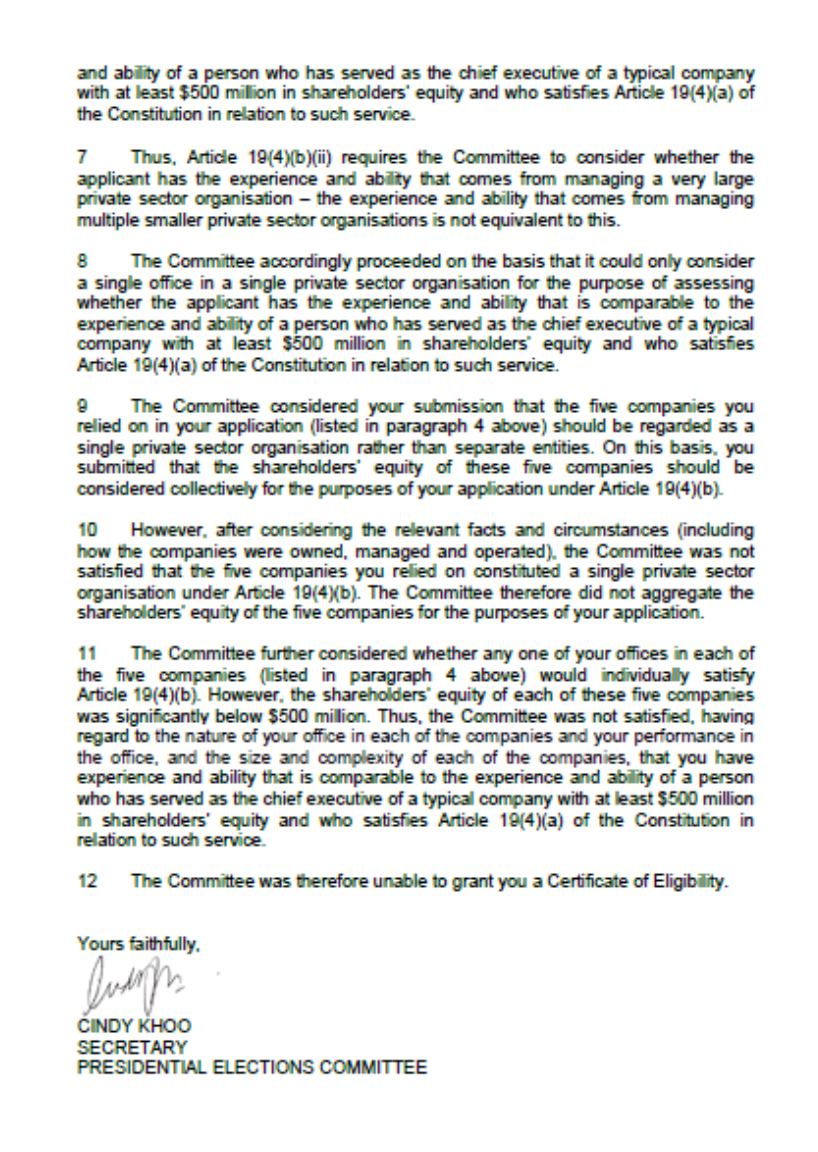Last Updated on 2023-08-29 , 11:38 am
On 18 August, it was confirmed that former senior minister Tharman Shanmugaratnam, former GIC investment chief Ng Kok Song, and former NTUC Income chief Tan Kin Lian qualify to run for president.
However, businessman George Goh was not granted a Certificate of Eligibility.
He called the Presidential Elections Committee’s (PEC) decision “unfair”.
He even claimed that the PEC did not explain the rationale behind its decision.
The PEC has since responded to his comments.
PEC Released Full Letter Sent to George Goh
In response to Mr Goh’s comments, the PEC released the full letter sent to him.
The PEC named the companies Mr Goh had used for his application in the rejection letter.

In his application, he said he is the group executive chairman of Ossia International, executive deputy chairman of Pertama Holdings, group executive chairman of ITG International, chief executive officer of Crown Essentials and chief executive officer of Vernal Ventures.
A media statement by his legal and financial team said it submitted “a very strong case detailing my [Mr Goh’s] experience and performance managing five companies which met the shareholders’ equity and profitability criteria”, even adding that he was “the most senior executive in each of these companies.”
Notably, Crown Essentials is registered in the British Virgin Islands.
Furthermore, Article 19(v)(b)(ii) of the Constitution requires the PEC to consider whether the applicant has the experience and the ability that comes from managing a very large private sector organisation.
The PEC said that “the experience and ability that comes from managing multiple smaller private sector organisations is not equivalent to this.”
The PEC said it processed Mr Goh’s application on the basis that it could only consider a single office in a single private sector organisation.
It also considered Mr Goh’s argument that the five companies included in his application should be seen as a single private sector organisation.
However, the PEC said it was “not satisfied” that the five companies constituted a single private sector organisation.
It said it considered the relevant facts and circumstances, including how the companies were owned, managed and operated.
Mr Goh also submitted that the shareholders’ equity of the given companies should be considered collectively.
As the PEC was not satisfied that the five companies constituted a single entity, the shareholders’ equity of the five companies was considered individually instead.
The Committee then examined whether any of the companies could qualify individually under Article 19(4)(b).
Unfortunately, the shareholders’ equity of each company was significantly below the criteria of $500,000,000.
In its letter to Mr Goh, the PEC wrote, “Thus, the Committee was not satisfied, having regard to the nature of your office in each of the companies and your performance in the office, and the size and complexity of each of the companies, that you have experience and ability that is comparable to the experience and ability of a person who has served as the chief executive of a typical company with at least $500,000,000 in shareholders’ equity and who satisfies Article 19(4)(a) of the Constitution in relation to such service.
“The Committee was therefore unable to grant you a certificate of eligibility.”
You can read the full letter here:


Background
Previously, Mr Goh was confident of his eligibility based on his argument that managing five companies was equivalent to a CEO running a single company.
He even shaded presidential hopeful Mr Ng Kok Song for being a “CIO”.
At a press conference held in his house on 18 August, Mr Goh said he could not accept the PEC’s decision, feeling that it was “unfair”.
In a media statement, he said that the PEC “took a very narrow interpretation of the requirements without explaining the rationale behind its decision”.
He added that this decision has “deprived” Singaporeans of more voting options.
When asked if the PEC had provided any specific reason for his rejection, Mr Goh would only tell reporters that the Committee did its own review.
He added that another reason why he was previously confident of his eligibility was due to the team of experts he had assembled.
This team included a former attorney-general, a constitutional law professor, a former judge, a senior counsel, and others.
He asked, “This group of people are the top, top people in Singapore. Are you saying that they are all wrong? Cannot be – they are all from the system.”
When asked to reveal the names of the five companies he included in his application, he declined to do so.
He also declined to name them previously during a press conference he held after submitting his application for a certificate of eligibility.
The PEC released a statement on the night of 18 August, stating that it had “carefully considered” Mr Goh’s application under the private-sector deliberative track.
It added, “However, after taking into account the relevant facts and circumstances, including how the companies were owned, managed and operated, the Committee was not satisfied that the five companies constituted a single private sector organisation.
“Consequently, for the reasons explained in the Committee’s letter to Mr Goh, the Committee was unable to grant Mr Goh a Certificate of Eligibility under Article 19(4)(b) of the Constitution.”
Rejecting Mr Goh’s claims, the PEC decided to make the letter public.
It added, “Mr Goh’s application acknowledged that the five companies he relied on are not a unitary company and are not owned by a common holding company, but Mr Goh submitted that the five companies should be regarded as a single private sector organisation.”
The Last We See of George Goh?
At the press conference held in his home, Mr Goh was asked if he would consolidate his companies or build a $500,000,000 company to be considered for future presidential elections.
However, he reiterated that he had already met the shareholder equity criterion for private sector candidates.
He said, “It is not ‘tomorrow I have to try and work harder’ – it is already there.
“If I continue what I am doing now as an independent candidate, it is whether the system allows me to go in or not. We should ask this question.”
He added, “I have $507,000,000 [in shareholder equity]. I don’t know what they want. We should ask them.”
Questions about whether Mr Goh would meet the eligibility criteria have been raised since he announced his intention to run for presidency on 12 June.
On 4 August, he said his five companies were equivalent to an average shareholders’ equity of $507,000,000 annually.
However, analysts have previously said that it is uncertain if a candidate can combine the average shareholder equity of several companies to meet the criterion.
Elections Department Doesn’t Always Disclose Reasons Behind Rejection
The PEC releasing Mr Goh’s rejection letter is actually a rare case.
In fact, on Friday, the Elections Department (ELD) said that it would not publish the reasons for the PEC’s decision given to unsuccessful applicants, including their names.
This is due to concerns that potential applicants may be discouraged from stepping forward to contest the elections out of fear of embarrassment.
The ELD added that unsuccessful applicants are allowed to publish the PEC’s reasons provided to them.
In this case, we only know about Mr Goh’s rejection because his presidential bid was public.
Very public.
There are a few cases where the ELD can reveal reasons for rejecting applicants.
Such situations include cases when the applicant’s application was not made according to legal requirements, when the applicant decides to publish the reasons given to them by the PEC, and when the PEC decides that publishing the reasons is necessary to respond to public allegations against the PEC.
In Mr Goh’s case, it is reason number three.
After all, he did call the decision “unfair” and claimed that there was no explanation provided behind his rejection.
Keep 1 September Free
Since there are three qualifying presidential candidates, we will probably have a public holiday on 1 September.
Thanks qualifying candidates!
However, there’s still a chance that 1 September may not be a public holiday.
You can find out why here:
Of course, unless the qualifying candidates forget to bring their nomination papers, certificate of eligibility, community certificate or political donation certificate on Nomination Day on 22 August, we should still have our holiday.




